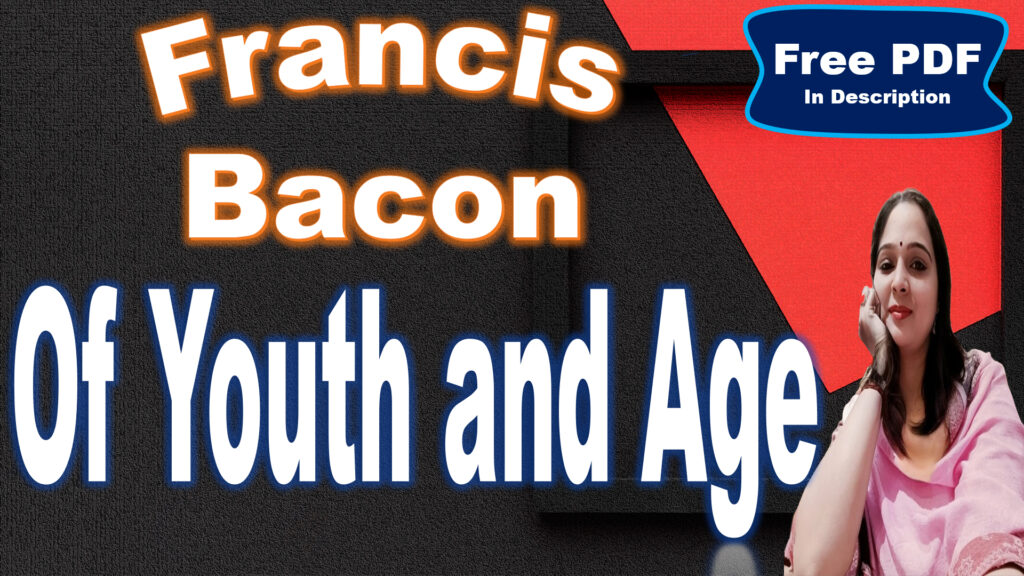
Write the critical appreciation of the Essay “Of Youth and Age”.
Francis Bacon’s essay “Of Youth and Age” dives into the differences between young and old people, discussing their strengths and weaknesses. Written in the early 17th century, Bacon’s insights are still relevant today, offering a timeless look at human nature and behavior.
Introduction
In “Of Youth and Age,” Bacon looks at the good and bad qualities of both youth and age. He talks about how these stages of life affect how we behave, make decisions, and get things done. By comparing the energetic and imaginative qualities of youth with the cautious and experienced nature of age, he suggests that a balance between the two is ideal. Bacon uses examples from history and philosophical reflections to support his points, making the essay both insightful and engaging.
Structure and Style
The essay is organized in a clear, logical way. Bacon starts with a general comparison of youth and age, then goes into specific characteristics of each, using historical examples to illustrate his points. The essay ends with thoughts on how combining the strengths of both youth and age can lead to the best outcomes.
Bacon’s style is clear and precise. He uses short, impactful statements that make complex ideas easy to understand and remember. His use of metaphors and analogies helps to paint a vivid picture of his ideas, making the essay more engaging.
Themes and Ideas
Contrasting Qualities of Youth and Age
The main theme of the essay is the difference between youth and age. Bacon sees youth as a time of creativity, energy, and boldness. Young people are full of fresh ideas and eager to innovate. However, their lack of experience often leads to impulsiveness and poor judgment. In contrast, age brings wisdom, caution, and a wealth of experience. Older individuals are better at making prudent decisions and managing established projects but may be overly conservative and hesitant to take risks.
Balance and Complementarity
A key idea in Bacon’s essay is the importance of balancing the strengths of youth and age. He argues that the best approach is to combine the creativity and energy of youth with the judgment and experience of age. This balance allows for innovation tempered with wisdom, leading to better results. Young people can learn from the experience of their elders, while older individuals can benefit from the fresh perspectives and enthusiasm of the young.
Passion and Temperament
Bacon also explores how passion and temperament affect effectiveness. He notes that those with intense desires and strong emotions often struggle to harness their passions productively in their youth. Historical figures like Julius Caesar are examples of people who became more effective leaders after reaching middle age. Conversely, those with calmer dispositions, such as Augustus Caesar, may excel in their youth due to their balanced nature.
Challenges and Pitfalls of Youth
The essay highlights specific challenges associated with youth. Bacon describes young people as prone to taking on too much, acting impulsively, and making mistakes without acknowledging them. He uses the metaphor of an untrained horse to illustrate their energetic but uncontrolled nature. This impulsiveness can lead to errors that ruin business and hinder success.
Cautious Nature of Age
In contrast, Bacon discusses the conservative tendencies of older individuals. He notes that older people tend to overthink decisions, avoid risks, and often settle for moderate success. They consult excessively, act cautiously, and regret their decisions quickly, leading to missed opportunities. This cautious approach can prevent them from fully realizing their potential.
Divine Inspiration and Perception
Bacon touches on the theme of divine inspiration and the clarity of perception at different stages of life. He references a rabbinic saying to suggest that young people, with their clearer visions, are closer to divine inspiration than older individuals, who experience dreams. This implies that youthful minds have a purer connection to creativity and innovation, while older minds are more reflective.
Premature Maturity
The essay concludes with a reflection on premature maturity and its potential drawbacks. Bacon warns that individuals who mature early may fade quickly. Those with sharp minds in their youth may lose their edge as they age. Natural talents, such as eloquent speech, may be more suited to youth than old age, as seen in historical examples.
Historical and Philosophical Context
Bacon’s essay is deeply rooted in the historical and philosophical context of his time. The early 17th century was a period of significant intellectual and scientific development. Bacon’s promotion of empirical methods and the scientific approach was revolutionary, challenging the prevailing Aristotelian philosophy. His ideas laid the groundwork for the Enlightenment and the subsequent development of modern science.
Bacon’s use of historical examples, such as Julius Caesar and Augustus Caesar, reflects his deep knowledge of history and his ability to draw relevant parallels. His philosophical reflections on human nature and behavior are grounded in his broader views on knowledge and ethics.
Legacy and Relevance
The enduring relevance of Bacon’s essay lies in its insightful exploration of human nature. The themes and ideas he discusses are universal, going beyond the specific historical context in which he wrote. The contrast between youth and age, the importance of balance, and the impact of passion and temperament are all issues that remain pertinent today.
Bacon’s emphasis on the balance between youthful innovation and aged wisdom is particularly relevant in contemporary society. In a world that values both technological advancement and experienced leadership, his insights offer valuable guidance. The essay encourages a harmonious integration of the strengths of both youth and age, promoting mutual learning and collaboration.
Conclusion
Francis Bacon’s essay “Of Youth and Age” is a masterful exploration of the qualities and dynamics of youth and age. Through his concise style, historical examples, and philosophical reflections, Bacon provides a nuanced and insightful analysis of human nature. His advocacy for balancing the strengths of youth and age offers timeless wisdom, making the essay as relevant today as it was in the early 17th century. By highlighting the virtues and vices of each stage of life, Bacon encourages a deeper understanding of the interplay between youth and age, ultimately promoting a more balanced and effective approach to personal and societal development.
Write long note on Francis Bacon as Essayist.
Francis Bacon, a well-known figure from the 16th and early 17th centuries, is often called the father of English prose and one of the first great essayists. His essays are famous for their clear writing, deep insights, and practical wisdom. Let’s explore why Bacon is such an important essayist and what makes his work stand out.
Introduction and Background
Francis Bacon was born into a prominent family in London. His father was a high-ranking official, and his mother was highly educated. This environment influenced Bacon’s love for learning. He studied at Trinity College, Cambridge, and later at Gray’s Inn, where he trained as a lawyer. His education and background helped shape his analytical and thoughtful approach to writing.
Innovator of the Essay Form
Bacon’s collection of essays, “Essayes: Religious Meditations. Places of Perswasion and Disswasion,” was first published in 1597. This collection marked the beginning of the essay form in English literature. His essays cover a wide range of topics, from public matters to private thoughts, providing a broad look at life.
Bacon’s unique approach involved examining subjects from multiple angles, often presenting arguments for and against different ideas. This methodical style was innovative and set a new standard for essay writing.
Style and Prose
Bacon’s writing style is clear and to the point. He uses short, memorable statements, known as aphorisms, to convey deep insights. These aphorisms, such as “Knowledge is power” and “Reading maketh a full man; conference a ready man; and writing an exact man,” are easy to remember and packed with meaning.
His essays are known for their clarity and logical structure. Bacon avoids unnecessary words and focuses on delivering his ideas directly, making his writing accessible and engaging.
Themes in Bacon’s Essays
Bacon’s essays explore a wide range of themes, reflecting his interests and understanding of human nature. Some common themes include:
Knowledge and Learning: Bacon often discusses the value of education and the process of gaining knowledge. He emphasizes the importance of continuous learning and self-improvement.
Human Nature and Behavior: Many of his essays examine traits like ambition, envy, love, and friendship. Bacon provides insights into how these traits affect human behavior and relationships.
Practical Advice: Bacon’s essays are filled with practical advice on living a successful and fulfilling life. He offers guidance on handling adversity, the benefits of travel, and the art of negotiation.
Philosophical Reflections: His essays also contain deep thoughts on life, death, and happiness. He encourages readers to think about their values and the meaning of life.
Influence and Legacy
While Bacon borrowed ideas from earlier writers like Montaigne and Aristotle, his essays are highly regarded for their originality and depth. He did not just copy others’ ideas but built on them, adding his unique perspective.
Bacon’s influence goes beyond literature. His emphasis on observation and systematic thinking laid the groundwork for the scientific revolution. His essays continue to inspire writers, thinkers, and readers around the world.
Notable Aphorisms
Bacon’s essays are filled with memorable sayings that have become part of everyday language. Some notable examples include:
“If the Hill will not come to Mahomet, Mahomet will go to the hill.”
“Hostages to fortune” (from the essay “Of Marriage and Single Life”).
These sayings show Bacon’s talent for creating phrases that capture important truths and remain relevant across different contexts.
Modern Relevance
Bacon’s essays are still relevant today because they offer timeless wisdom on human nature and practical living. In a world that values both innovation and experience, his insights on balancing youthful energy with aged wisdom are particularly pertinent.
His essays encourage mutual learning and collaboration between generations, highlighting the benefits of combining the strengths of both youth and age.
Conclusion
Francis Bacon’s contributions as an essayist are unmatched. His essays, known for their clarity, practical wisdom, and memorable aphorisms, continue to resonate with readers today. Bacon’s ability to simplify complex ideas into easy-to-understand statements has made his work timeless. Through his essays, Bacon provides valuable insights into knowledge, human nature, and the art of living, securing his place as one of the most important figures in English literature.





